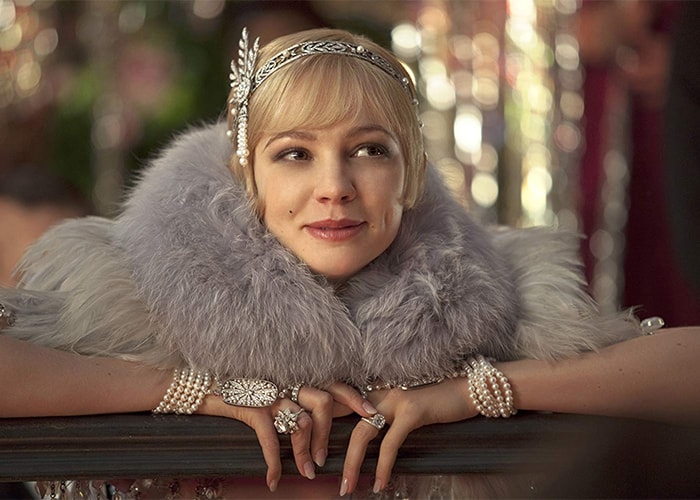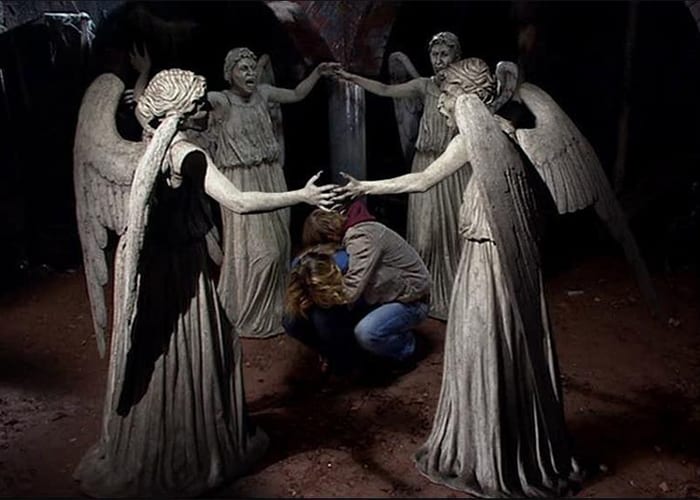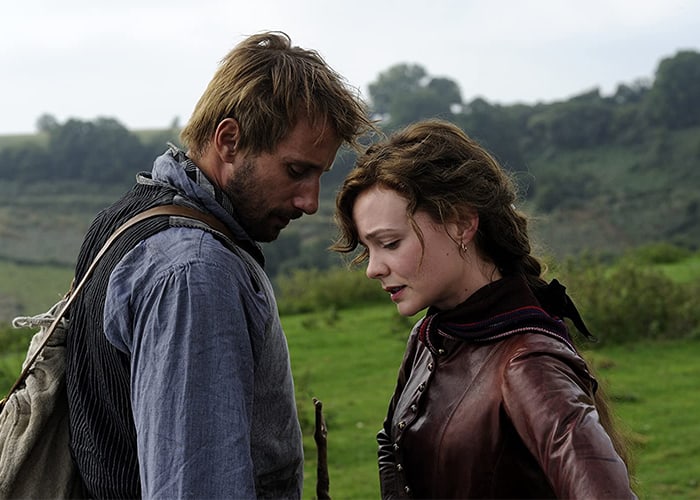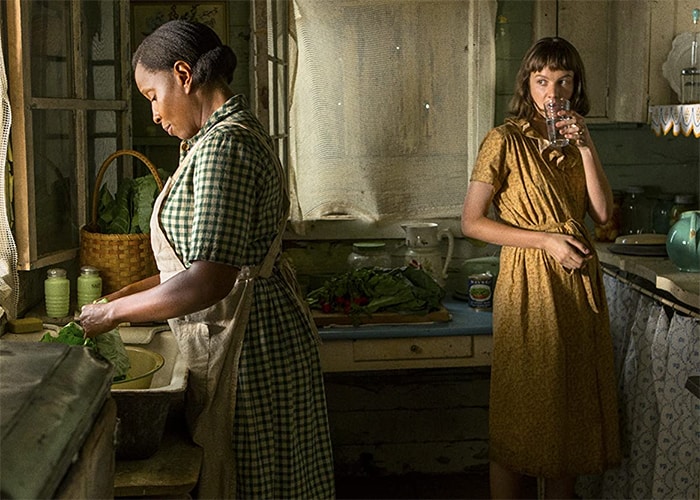
Welcome to Filmographies, a biweekly column for completists. Every edition brings a new actor’s resumé into focus as we learn about what makes them so compelling.
Carey Mulligan first caught my attention when she appeared in Wall Street: Money Never Sleeps. While Oliver Stone’s sequel to his well-received 1987 film Wall Street had plenty riding on it to be as incisive as its predecessor, then-rising star Mulligan ended up stealing the show.
By no means is Money Never Sleeps the pinnacle of cinematic interpretations of the fallout of the disastrous 2008 financial crisis. Despite the film’s timely situational setting, the movie meanders, no thanks to a frustratingly unanimated script. Still, Mulligan brings warmth and emotional resonance with her performance. In a much smaller role alongside Michael Douglas and Shia LaBeouf, she is a breath of fresh air.
Money Never Sleeps may have been Mulligan’s first major studio picture, but the sequel underrepresents exactly what she’s capable of. Maybe we’re most familiar with her melancholia. There is a lot of crying in many of the films she’s in. Yet, the truth is, she colors a breadth of emotions in soft gradients, fleshing out a variety of stories of the human condition with full-bodied depth and nuance.
Determining which of Mulligan’s ventures is truly worth her talent actually reaps surprising results, especially at the start of her career. Mulligan’s first roles in both television and film involved distinguished casts and stories that are essentially household names. In 2005, Mulligan featured in the small-screen version of Charles Dickens’ Bleak House and Joe Wright’s cinematic adaptation of Jane Austen’s Pride & Prejudice. As the orphan Ada Clare and the oft-ignored Bennet sister Kitty, respectively, Mulligan easily adopts the refrain of innocence that both characters share. Clear-eyed, rosy-cheeked, and smiley, she is sweetness personified.
She is, however, easily more noteworthy as Ada, despite the vast international significance of the latter film. Ada just has an inherent loveliness about her. She also mirrors one of the series’ traditional heroines in terms of narrative circumstance, making her immediately more conventionally “likable.”
Meanwhile, in Pride & Prejudice, the shrill Kitty is most analogous to the wild Lydia Bennet. A particularly airy Mulligan spends an ample amount of time following her unruly sister around throughout the movie, which only reflects badly on her. It’s important to note that other Austen adaptations have come to redeem Lydia — and hence, the concepts of wily and inconsequential behavior. Wright’s film prefers to leave the brasher Bennet sisters unformed, though. Consequently, through no fault of Mulligan’s, Kitty becomes one of the indistinct footnotes in Pride & Prejudice.
Of course, Pride & Prejudice is a worthy film in numerous other respects, as evidenced by numerous Oscar and BAFTA nominations and its celebrated longevity in the film community. If nothing else, being a part of a larger whole can be extremely gratifying. Notably, this hasn’t always been the case. A handful of films in Mulligan’s repertoire only present the actress with roles akin to cameo appearances, namely And When Did You Last See Your Father?, Brothers, and Public Enemies.
What a waste, when Mulligan can absolutely make the right supporting characters genuinely illustrious. British offerings such as Northanger Abbey and My Boy Jack tease out Mulligan’s penchant for range. The former is another Austen adaptation for the actress to play within. This time, Mulligan is decidedly gleeful as the conniving Isabella Thorpe, frenemy to Northanger Abbey’s protagonist. She turns in an inspired performance as a puppet master of mischief, manipulating almost everyone around her until her charade crumbles to her detriment. There is an artfulness to Mulligan when she revels in the petty, disguising her less honorable intentions beneath a veneer of chilling friendliness.
To then see Mulligan as the deeply saddened Elsie Kipling in My Boy Jack is a treat. It’s a film about filial relationships and her easy chemistry with lead actor Daniel Radcliffe feels authentic. The way Mulligan openly exudes pure love, tenderness, and strong-willed determination is certainly the most spirited aspect of the film, which is otherwise understandably upsetting by way of its subject matter.
Likewise, Mulligan is a ray of hope in Shana Feste’s The Greatest. In it, she plays Rose, a free-spirited artist archetype who falls in love with Aaron Taylor-Johnson’s golden boy, Bennett. Their scenes together, which are shown in flashbacks, create space for tragedy upon the latter’s sudden death. Rose’s later observations of and interactions with Bennett’s family subsequently bridge rifts and cracks that have opened up in their domestic dynamic. It is therefore up to Mulligan to tether the past and present-day journeys of The Greatest and remind audiences of the relationships that truly matter in the film.
Any discussion of Mulligan’s earlier endeavors requires mentioning her appearance as Sally Sparrow in the Doctor Who episode “Blink.” The long-running sci-fi series may hinge on the seemingly miraculous problem-solving capabilities of a self-regenerating time lord, but Sally is essential to one of the show’s best episodes ever. It is through her brave, inquisitive lens that the audience first encounters and defeats some of Doctor Who’s most terrifying baddies.

Mulligan would authoritatively put herself on the world map soon enough, starting with her Academy Award-nominated turn in Lone Scherfig’s An Education. What Mulligan does in this coming-of-age story is nothing short of sensational. She embodies her protagonist Jenny Mellor with utmost ease, diving headfirst into the throes of youthful disregard and contending with the loss of innocence. Mulligan is showstopping as this headstrong 16-year-old encased in idealistic dreams and an insatiable wanderlust, her approach to Jenny’s peculiarities organic and purposeful. The actress is the film’s linchpin, propelling her complex character directly into viewers’ psyches as a girl we would’ve once known (or been). Through Jenny, Mulligan speaks for young women everywhere who are expected to immediately “know better,” even if their influences are dire.
She soon moved on to Mark Romanek’s romantic tragedy Never Let Me Go, portraying one of the most devastating characters of her career. Adapted from Kazuo Ishiguro’s 2005 novel of the same name, the dystopian premise of the film presents life virtually everlasting for the human race. Sadly, this comes at the price of some, who are raised from childhood to be organ donors by their twenties.
Mulligan plays one such young woman — Kathy H — although her story is far from straightforward. Despite being suppressed by society to lead a generally subservient life, one cannot escape the spoils of youth. Kathy deals with love, loss, and betrayal, the effects of which weigh more heavily on her due to the commodity of time. These emotional cues could potentially produce a heavy-handed depiction, but Mulligan reroutes them skillfully. Her Kathy steals wistful, yearning glances at the object of her affections and nurses the wounds of a broken friendship with a grave acknowledgment that she doesn’t have the luxury to aimlessly mope. Mulligan imbues Kathy with necessary hard armor over her inherent softness, consciously trading one for the other when the circumstance requires it.
So begins a trend of stark contrasts in Mulligan’s filmography. Between 2011 and 2015, she would release two films a year and deliver strikingly disparate performances in each. Firstly, there’s Nicholas Winding Refn’s Drive and Steve McQueen’s Shame, and Mulligan is the raw heart of both.
Based on James Sallis’ eponymous novel, Drive unfolds like a fairytale. Mulligan meets Ryan Gosling’s stoic leading man, the Driver. Their eyes lock and a pure, unspoken bond blossoms. It is worth noting that Mulligan’s character, Irene, is rather different from her literary counterpart — one of the numerous disparities between the book and film. Originally conceived as a Latinx woman named Irina, the character is more deeply enmeshed in grit and grime in Sallis’ text. In contrast, Irene is conceptualized as a somewhat unmarred zenith of womanhood in Refn’s film. She is willing to reconcile with her ex-con husband in order to preserve order in the life of their son and keep their family together.
Still, by the time Irene chooses this path, her eye has already wandered towards the Driver, practically forgivably so. He is seemingly untethered to the problems of her everyday life, and they both symbolize an escapist fantasy for one another. There’s no denying Gosling and Mulligan’s chemistry. They say plenty without having to utter a word. Mulligan is trustful but not irresponsibly doe-eyed in Drive – a grounding force in Winding Refn’s neon-drenched dreamscape of pop music and garish violence.
Shame, on the other hand, is about uncontrollable desperation. Its primary narrative revolves around the sex addiction of a single male business executive played by Michael Fassbender, and Mulligan tends to float in and out of the narrative. That said, she memorably injects destructive impulsivity into the proceedings. Mulligan’s presence is deeply felt in the corners of the frame. As much as Fassbender’s trainwreck of a lead distances himself from all manner of emotional connection, his equally fucked-up sister snaps, wails, and begs for attention. Moreover, in her painfully subdued moments, Mulligan emanates soul-crushing sadness.
In 2013, the sparkling glitz of Baz Luhrmann’s The Great Gatsby and the musty, icy gloom of the Coens’ Inside Llewyn Davis saw Mulligan portray women who could be deemed — for want of a better term — insensitive. At least, they seem to be on the surface. She often hurls venomous (and amusing) insults at the eponymous protagonist in the latter, relishing in moments when she can declare him an irredeemable asshole. Regardless of these harsh sentiments, though, she hints at a softer heart in the few appearances she does make throughout the film. Mulligan is no-nonsense and pragmatic in Inside Llewyn Davis, but she is willing to help the ones she cares about.
The Great Gatsby serves as a significantly bigger challenge for Mulligan on multiple fronts. Firstly, it’s Gatsby — the beloved F. Scott Fitzgerald classic that’s so often reimagined for stage and screen alike. And if three prior big-screen versions serve as any indication, the essence of the book is incredibly difficult to adequately distill into a two-hour package. Lastly, Mulligan steps into the shoes of Daisy Buchanan, a key polarizing player in the sad, tumultuous life of protagonist Jay Gatsby.
To her immense credit, Mulligan creates a resonant inner life beneath Daisy’s perceived frivolity. Despite the many men of The Great Gatsby fighting to tell her life story for her, Daisy is underscored with enough dissatisfaction and restlessness to vouch for herself. Mulligan empowers Daisy by emphasizing the importance of her moral compass, even if it is flimsy enough to merely prioritize guileful self-interest. Daisy is far from unknowingly impetuous. Mulligan’s faraway expressions of woe ensure that she is fully aware of how much her dreadful actions affect others. She chooses the easy way out time and time again, but these decisions do not exempt her from bearing the brunt of feeling in consequence.
Mulligan’s 2015 endeavors, Far from the Madding Crowd and Suffragette, can be considered her most overt portrayals of women’s empowerment. Under the soulful direction of Thomas Vinterberg, Mulligan stakes her claim on one of Thomas Hardy’s vibrant romantic heroines. She is Bathsheba Everdene in Far from the Madding Crowd, a charismatic and resilient young woman who is long-accustomed to fending for herself since youth.
Such independence compels Bathsheba to command the respect of her male peers when she comes of age and inherits a family farm to her sole name. Conversely, she must also grapple with the concept of matrimony – specifically, her lack of desire to marry — with three different suitors, all of whom introduce her to the varied implications, incentives, and pitfalls of traditional domesticity.
For the record, Bathsheba does choose a partner by the end of the film. Thankfully, it is not at the expense of her marked individuality. Mulligan highlights Bathsheba’s many facets and contours, incubating her yearning and desire incrementally and naturally. Thus, the character’s feisty demeanor develops nuance as she ages and matures, allowing her to finally arrive at a crucial understanding that companionship is enriching and important.

Maybe one could be forgiven for thinking Suffragette would serve as a play-by-play retelling of women’s suffrage in the UK. I certainly did. In reality, Sarah Gavron’s historical drama is a character study of but a single section of the movement. The focus is on Mulligan’s character, Maud Watts, who is suddenly thrown into the deep end of suffrage. Although she inadvertently stumbles into activist spaces at first, a spark ignites in her the more she speaks and acts out against the injustices her immediate community faces.
Maud’s revelations don’t change the fact that she remains a single cog in a complex societal system. Repeatedly, audiences are made aware of just how much distress and violence are part and parcel of women’s claustrophobic daily lives. In response, Mulligan rides the edge between control and disarray in what amounts to one of her most carefully calibrated performances. Although Maud is no expert in espionage — she slips up plenty as she learns about the tenets of activism — she is keenly aware that her mistakes could mean the loss of her life, livelihood, and what little freedoms she possesses. Mulligan takes every character cue, good or bad, in stride. She isn’t at all pitiable to behold. Hence, Maud’s critical metamorphosis from timid commoner to tough vigilante is seamless.
And as all great chameleonic actors are wont to do, Mulligan doesn’t stay expressly likable for long. Three of her most recent projects closely study interpersonal conflict and a sense of belonging in their respective mediums. Unfortunately, Netflix’s Collateral — a four-part police procedural — doesn’t truly establish proper agendas for the crisscrossing actions of its large cast of characters. That said, Mulligan is a vital driving force in the show. Clear-eyed, probing, painfully honest, but often more than a little hasty at times, her character is the least muddled of the lot. Mulligan does such a great job, I can’t help but wish for more episodes on the docket to learn more about this character.
It is Mudbound and Wildlife that bring out the true agony in Mulligan’s women of discontent. This harks back to The Great Gatsby era of her career, except both films wallop where Gatsby lightly chastises. Mudbound, as a whole, is one of Mulligan’s career greats. Set in World War II, it is a sweeping epic of a historical drama about two American families, one black and one white, and how their daily lives intersect in the Deep South.
Mudbound explores racist social systems and mores, both implicit and overt, that are integral to Americana. Notably, Mulligan plays one of the more consistently sympathetic characters in the film: Laura, a once-naïve woman who finds herself in a passionless marriage yet feels most at home as a typical homemaker. When her husband insists that their family move to Mississippi to live as farmers, she hardly objects because matrimony has so far kept her safe.
Nonetheless, Laura finds herself entangled with the African-American family working on her husband’s farm, particularly the matriarch Florence (who is emphatically played by Mary J. Blige). Mulligan does an excellent job of conveying Laura’s perspective and personal pain without discounting the character’s more privileged position as a white woman in this rural community. Therefore, the solidarity forged between Laura and Florence becomes one of the film’s few safe havens, however temporary that may be.

Finally, Wildlife is a mystery of a film. Not because director Paul Dano deliberately creates a convoluted, inscrutable narrative. Rather, Wildlife so heavily relies on the turmoil of its characters — and the emotional literacy of its actors — that logic becomes intertwined with affairs of the heart.
The facts are these: Mulligan plays Jeanette, a former teacher whose nuclear family often struggles with money, so much so that they’ve had to move houses several times. By the time the audience catches up with them, multiple stressors are already affecting Jeanette. Having married and had a child at such a young age, she misses her youth. Her husband insists on being the primary breadwinner of the family and she is mostly housebound, raising their 14-year-old son. Their constant displacement prevents her from finding a solid friend group, exacerbating her loneliness. So, when given a sliver of a chance, Jeanette takes her life back the moment her husband is away from home.
Mulligan unspools Jeanette’s desires and imperfections in morsels, successfully avoiding any potential for insincere melodrama. Try as she might to cling to some semblance of rationality, her glassy, tired eyes tell a darker story of a truly dire emotional state. Viewers have perceived Mulligan at her wit’s end before. Only this time, she is considerably wearier.
Rarely has Mulligan gone after the wrong role, nor has predictability been a staple in her filmography. This pickiness certainly limits the number of times film fans get to see her on the big screen; her resumé seems so much shorter compared to this column’s previous subjects. That said, audiences frequently witness Mulligan’s ability to wring heart and soul with her line-up of rewardingly imperfect women. And they are far from forgettable.
Related Topics: an education, Carey Mulligan, Filmographies, Mudbound, Wildlife

